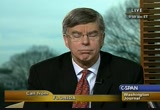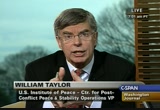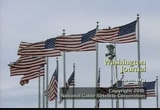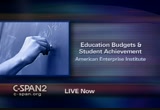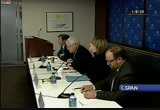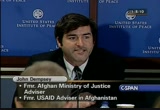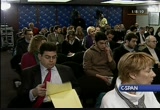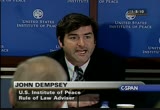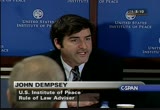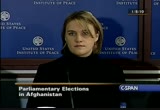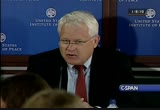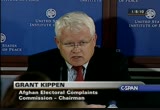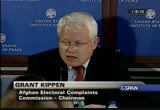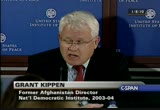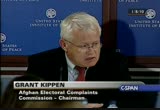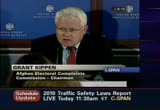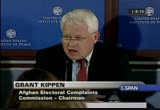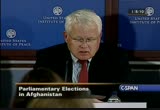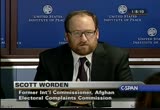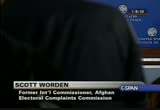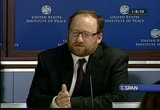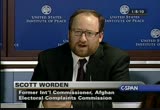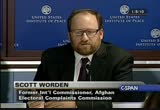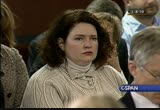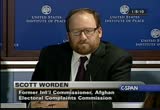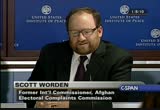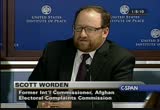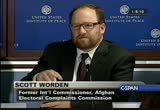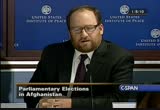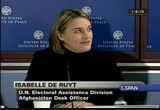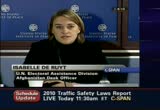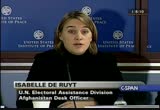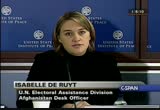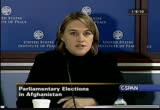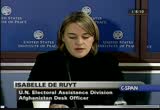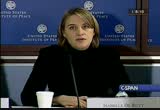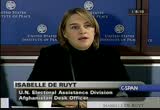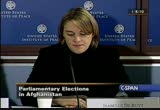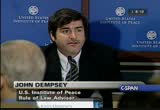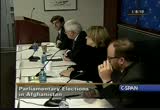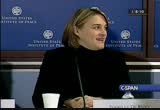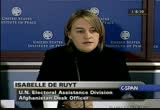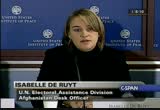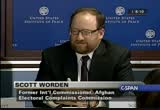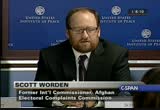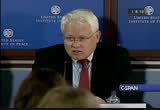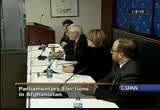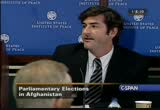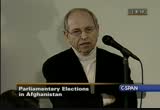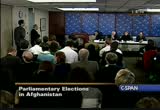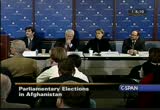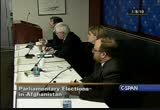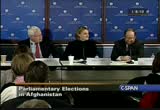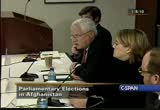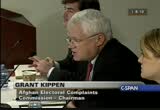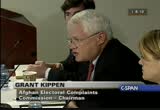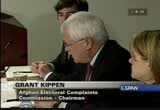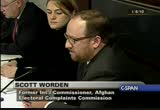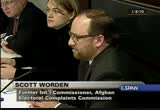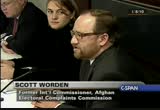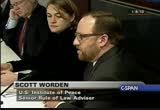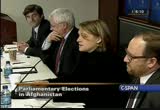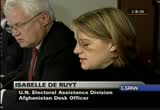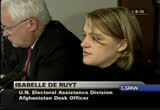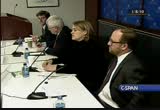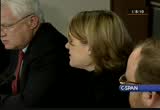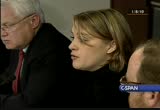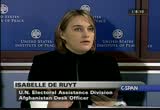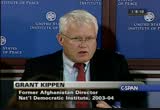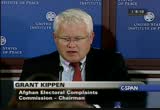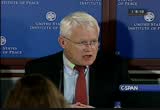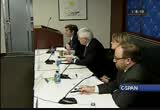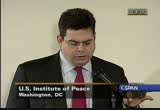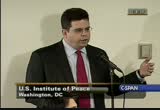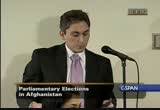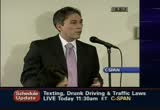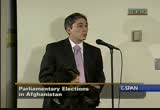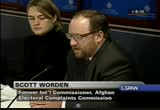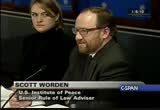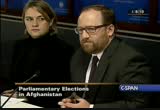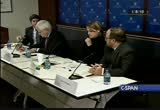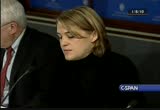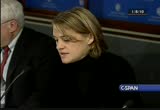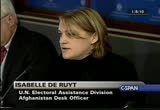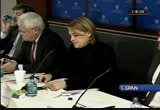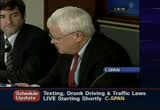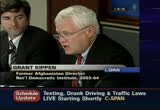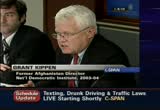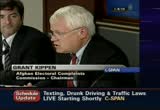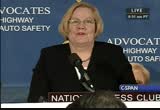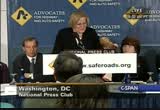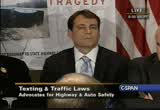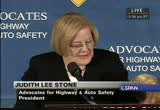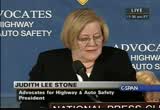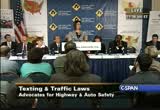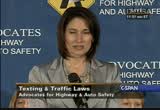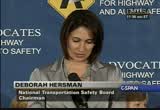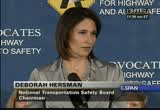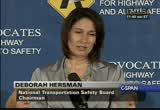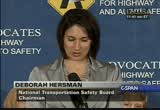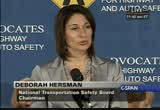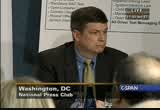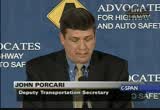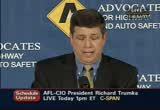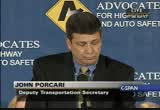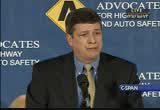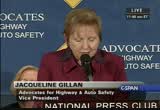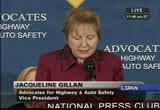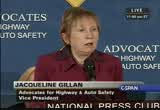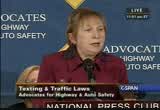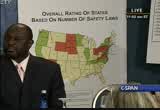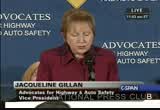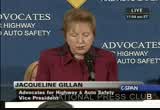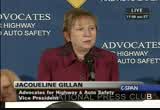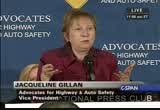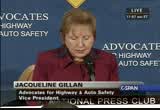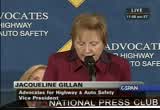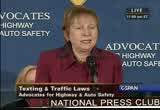tv Today in Washington CSPAN January 11, 2010 10:00am-12:00pm EST
10:00 am
i think we should be telling people -- the people of afghanistan to not hang around with people with guns and violence because they are in danger in themselves. also, america never targets the innocent like terrorists do. we are there to protect them from the terrace. if they do not hang around them, they are not in any kind of danger. i want to make one more statement about elections. i think a lot of times not everyone has a lot of experience. i think we vote for people who we think would make good judgment. even in america, we vote for someone, we vote for someone that we think has good judgment. . .
10:01 am
10:02 am
thank you for joining us this morning. that will about do it. we're back here tomorrow morning at 7:00 eastern with more of your calls and comments. we look forward to that. hope you have a good day. >> a number of live events coming up freak you today on the c-span network. coming up in 90 minutes, a panel discussion on texting, a drunk driving and traffic laws. you can watch that right here on
10:03 am
c-span. a little bit later, we will talk about unemployment and the future of the labor movement. that will be from the national press club. the candidate to succeed ted kennedy in the u.s. senate are set to debate later today. it will discuss the issues live at 7:00 p.m. eastern on c-span. on c-span2, our live coverage has already begun of a daylong education forum. topics include budget. that is live now on c-span2. now to an event with members of the electoral complaints commission in afghanistan. they talk about the country's upcoming parliamentary elections. from the u.s. institute of peace here in washington, this is
10:04 am
about two hours. we want to let you know that we will show you as much of this as we can until the discussion of texting and traffic was gets underway. that will be about 11:30. >> this is our first public event on afghanistan of 2010. i am happy that we had such a good turnout. i look forward to a frank discussion with our distinguished panelists today on a subject that clearly has been getting a lot of attention over the last year given what we saw during the difficult election season in afghanistan last year. it has not yet gone away. once we got through the difficult process of the elections last year, people
10:05 am
were breathing a collective sigh of relief that we moved on and we could actually get on with governance in afghanistan and moving forward with strategic objectives and the country. but yet we have another election seemingly just around the corner and so we have to ask the question, what does that mean for afghanistan's political development? but does that mean for international programs in the country? -- what does that mean for international programs? how do we avoid the problems we faced last year? before i introduce our speakers, let me give you a little bit of perspective, having lived in afghanistan for the last seven years working on rule of law and governance issues. in 2004, i observed the country's first presidential election. in 2005, i observed the
10:06 am
parliamentary elections and did the same last august for the presidential and provincial council elections. i cannot overstate the difference in the mood in afghanistan between 2004 and last year. back in 2004, there was a -- there was some energy that you could really feel in the air. afghanistan was going in the right direction and people were expecting that the promises made were going to be met and that the institutions of governance and democracy were being built, that reconstruction efforts were going to lead to a tangible improvement in people's lives. the 2004 elections were widely deemed to be an overwhelming success with high turn out, over 70%. violence was kept at very low levels. voting irregularities, while they existed, were kept at relatively low levels as well. with a large number of women turning out to vote.
10:07 am
people thought that afghanistan's democratic development was going in the right direction. if you contrast that with what we saw last year with high levels of fraud and local voter turnout, i think it is a reflection of the fact that people are frustrated in afghanistan with the way that their democratic development has gone. they're frustrated -- we want to try to ensure that the mistakes of 2009 are not repeated. that said, there were some bright spots last year. one in particular, the electoral complaints commission, two of whose members are here today on the panel, was able to maintain its independence from political interference to such a degree that they were able to pinpoint the amount of fraud, discount the number of ballots, and
10:08 am
require there be a second runoff. thereby, and taking the initial count down under 50% and having president karzai except that, which was a good step for afghanistan. the runoff never happened, but at least the ecc was able to maintain its independence and show that the rule of law does matter to some degree in afghanistan. with that, let me briefly introduced are three distinguished speakers and turn it over to them to speak just for a few minutes, no more than 10 minutes each. to my far left is scott worden. he has just returned to the institute here. he was on a leave of absence last year to work as one of the three international members of the electoral complaints commission. scott was also involved in the
10:09 am
elections in 2005, the parliament. you have their bios in their -- in front of you. isabel is sitting next to scott wright -- scott's right. she has worked in afghanistan at back in 2005 as a political adviser and knows quite a lot -- knows quite a lot about the afghanistan elections. to my left is a grant kippen. he was the chairman of the ecc both in 2005 and this past year in 2009. but scott and grant were at the center of this maelstrom last year, so please be quite pointed with your questions and try to get information on what was happening behind the scenes. these guys were really at the
10:10 am
center of what was going on and what was paid -- and extremely difficult period in afghanistan. scott, if you want to start. >> we will switch the order. >> grant, take it away. >> thank you very much. i thought -- scott and i had a little discussion last night about how we would go forward with this discussion this morning. i what i would like to do is lead off with a little bit of an introduction to the ecc. as many of you know, of the two electoral bodies in afghanistan
10:11 am
, the ecc is a temporary body and it is only in existence for the period of the election campaign. it will cease to exist up to 30 days after the certification of final results. the final certified results were released in the third week of december so our mandate officially ends about the 25th of january. our mandate is to investigate and adjudicate all challenges and complaints with respect to the electoral process. we have a role both within the nomination. , one candidate come forward with their nomination papers, as well as during the campaign. and -- the campaign period of and after the campaign.
10:12 am
in 2009, we had a headquarters in kabul and offices in all 34 provinces around the country. i would like to say that one of the things i was enormously proud of were the efforts of our staff around the country. of that number, only about 18 or so were international. the rest were afghan nationals, and i do not think there was one individual on staff that had been with the ecc prior to 2005. we were working with a totally new group of people. in addition to our official role, which everybody looked on with great interest, one of the other major roles that we had "was a professional development 1. -- was a professional development one.
10:13 am
we had to get them to understand what the rules and responsibilities were. it was an enormous undertaking for these elections. one of the challenges that we had in 2009 was that we were established quite late in the process. our first meeting as the commission took place on april 26 and we were very quickly into the candidate nomination period. at that time, we did not have a headquarters in place. we did not have any staff identified, aside from a couple of people who had been sent to us in support of the early going. we had an enormous task ahead of us in terms of adjudicating complaints and challenges and also getting the organization up and functioning. one of the other major challenge
10:14 am
as we saw its -- as we saw it -- and i do not want to be too difficult on this -- we took on a lot of ross -- responsibilities that did not rest with us. they were quite willing to put the decision making on us. in one instance, on the challenge. period, these are activities that could have easily been done by the iec. it felt like we should be the ones that made the decisions. that continued for the entire process. we had a new crew learning as we went, it placed an enormous
10:15 am
burden on the organization as he went through. in terms of lessons learned, and a scott is going to get into this in more detail, one of the major lessons learned is how much as an international community is all the time we did not use to do the ground work that needed to take place. if you look at the observer reports from 2005, you will see a lot of recommendations in those, some of which, a voter education needed to take place. it really did not occur in the interim period. it was very late getting going in 2009. the other thing that struck me was the lack of understanding about the process as a whole.
10:16 am
candidate, in particular. i remember going to a meeting -- this was a meeting that was hosted by the elections commission, the minister of interior was there. the topic was providing security and transportation to presidential candidates during the campaign. some of you may know that there is an assassination clause that if there is a death of one of the candidates from the presidential election, you have to start the process all over again. it was interesting try to make sure that all of the candidate remained alive during the electoral period. my point is, aside from the transportation security issues, during the q&a period, candidate
10:17 am
got up and said, this is nice that this is being offered. what we are really interested in it and is where can we get the money to campaign. they thought it there was going to be some magic pot of gold once they join this club of presidential candidate. that, unfortunately, was not the case. many of the candidate did not understand what the process entailed. the volume of complaints that we have received, not so much during the campaign period, but after election day going forward. i am going to stop there and let scott carry on and look forward to your questions later on. >> picking up from that, one of the benchmarks that the ecc set
10:18 am
for ourselves when we started was to make progress. we did that in several ways. john already mentioned that overall, ecc decisions were a great focus of the election and of the public and hopefully, we discharge our duty well in terms of holding the rule of law. for the course of the process, we found that there was still great interest in the elections and in complaining about the elections. we had about 3000 complaints over all throughout the various phases of the campaign. with this new and overwhelmingly afghan staff, the ecc was able to thoroughly investigate all of them and hopefully our decisions represented to a model of transparency that can be built on in future elections. another focus of our work was
10:19 am
the vetting process. in 2005, there were clauses that called for preventing members of the legal groups from standing for election. it had mixed success. this process was undertaken again in the recent elections. we wound up excluding 55 candidate, mostly from the provincial council great. on the basis with their links to illegal armed groups. it represented a lot of progress. we have hundreds of complaints about people's bad acts in the past, mostly criminal activity, which was not part of our jurisdiction. it was good for the process of afghanistan. we were able to exclude a decent number of candidate who had not given in their weapons, who had not committed to the rule of law. this went on without much
10:20 am
objection. another big success that grant mentioned was the capacity building elements of that period of our staff, despite the focus on the fact that there were international commissioners, it was an international process. to do this on a provincial basis, we had offices in all 34 provinces. they were entire afghan staff. it represents a good accomplishment to build equity at the local level for running elections independently from international assistance. the negative aspects of the elections, of course, was there a significant amount of fraud. the presidential election was pretty well documented in the press. our investigations, on behalf of
10:21 am
all candidate, though obviously more for karzai in terms of volume. we wound up in validating about 1.2 million ballots based on our investigation that led to a second round. we found across the board there was quite a bit more passion on the part of the complaining from the canada its themselves at the provincial council level. it matters greatly for candidates. there is not so big of a government mandate. looking at that rate, you see a bit of a preview. a lot of candidates, a lot of this -- scrutiny of the process. our investigations when on in all of the provinces. we investigated hundreds of
10:22 am
ballot boxes. we invalidated thousands of ballots. the announcement has come from the itc -- iec as to who won and who lost. the public is still waiting to see the outcome. there, too, we found significant fraud. with the presidential race, it revealed many flaws in the system that need to be corrected. there is a lot of opportunity for progress. i want to focus on three areas that i think were a fundamental to the irregularities that occurred in 2009. the need to be a focus in the short and long term of afghanistan elections. some of them cannot be resolved if they're going to have the elections in may. they need to be addressed if we are going to have progress in
10:23 am
the operation of democracy in afghanistan. the first and longest term issue is a voter registration and the creation of a voter list. for each of the elections, there has been a registration process. people get a voter card that makes them eligible to vote. a new exercise was conducted in the 2009 elections and date registered 4.5 million new voters. a lot of those were fraudulent. there were a lot of fake cards out there. identities could not be verified. in terms of investigating fraud in the 2009 elections, we cannot rely on the voter list at all. if there are 600 votes from a station, were there really 600 people who showed up and were they all eligible? this is something that does not create fraud on its own. it is a significant tool to use
10:24 am
in developing a situation as the gatekeeper to the electoral process. that needs to be fundamentally restructured, i think, if you are going to have reliable elections in the future. that is a longer-term fix. in the medium term, you cannot deny that one of the reasons for problems in this election was security. it has two aspects. one, keeping people away from the polls, to an extent, but also is prevented observers from monitoring the elections and making sure that whatever -- what irregularities -- what irregularities were undertaken were reported. you had a lot of polling stations with lots of ballots very few voters. that is something that certainly needs to be addressed in the 2010 elections. or the polling stations in
10:25 am
places that can be secured, that can be observed? if it is in an area that is dangerous, you want butter's to access to the process, but you do not need as many ballots because of realistic expectations of turnout. the third area that was a fundamental problem had to do with iec personnel. it is candidate, their agents, of voters that commit the fraud. the need to take proactive measures to mitigate the risk of fraud. when fraud does occur, to actually take corrective measures. it is a really a double role between the ecc and the iec. the ecc is the reactive compound it. we can only react -- we can only act if there is an incident.
10:26 am
they take remedial measures. it really failed to do that. that was all put to the ecc. hopefully, we performed our job adequately. it is an overwhelming task and there needs to be a partnership between the two institutions. at the headquarters level, what you need to look to is, has learning occurred? we've not seen any statements in that say their work fundamental flaws and that they're going to correct it. unless that happens, you have to look at changing the management level if you are going to have a significant improvement for next year. more broadly at the provincial level, fraud occurred in an individual polling stations, quite remote locations. as a basis -- as a result of our
10:27 am
investigations just in the presidential race, we found that 1400 polling stations had 100% fraud. our methodology is that if we found significant evidence of corruption, we would invalidate the whole station. 1400 stations. individuals worry -- we also did an analysis and found that if you look at polling centers, a high school might be a polling center, 450 polling centers had at least half of their polling stations with fraud. we also did an analysis that found that 23 districts had at least half of their polling stations found fraudulent for the presidential race. this amounts to hundreds, if not thousands, of individuals who responsible for the conduct of elections there. maybe they were corrupt, or
10:28 am
intimidated. either way, we need to address a large staff issue to see what happened and do you have the right people in place? if not, the prospects for a better selection in 2010 are dim. let me leave it on that note. there are other issues that could be addressed in the q&a. that is an example of the short and long term approach that needs to be taken in conjunction with but grant said in terms of voter education, candidate education, so that you see that this is not an internationally driven process. rather, this is an organic afghan process to choose its leadership. i do not think that people are seen that yet. hopefully, they can start to see that in the next election to come. >> i will not take too much time
10:29 am
either. i would rather take more time for questions. i work for the electoral assistance division which is a small office in new york. it is tasked with assessing the situation ahead of elections in countries where either the security council or countries that have requested help. at the end of 2007, i participated in a needs assessment mission to afghanistan to assess the situation ahead of the presidential and provincial election. i would have to concur with participants here that we were disappointed to see that very little had been done since the 2005 election in terms of improving the capacity of the electoral institution,
10:30 am
improving the infrastructure. nevertheless, we made a number of recommendations at the end of our visit that we thought could lead to some improvement in the electoral process. i will not go through all of them, but i think some of them are still valid for the upcoming election. lesson that we have learned from a number of elections in difficult areas or in the country's recovering from conflict or who do not have large experience with electoral processes is that rather than trying to implement the number of technical fixes which might be difficult to either comprehend or put in place in countries that have not had a long electoral experience, it is essential that the people have
10:31 am
10:32 am
about what they are facing. one of the other recommendations is to try as much as possible to focus on it transparency, accountability, and that can take many ways. as scott mentioned, it is very important in that civil society, that all of the electoral stakeholders are full participants in the electoral process. the to make their own opinion about the process. -- they need to make their own opinion about the process. i was in afghanistan for the election in 2005. i worked for the out of country voting for the are runyon -- iranian refugees. there was a sense of uplifting that was not there during the last election.
10:33 am
this last process was very difficult. i think everybody recognizes that. we've created a number of -- it swallowed a lot of the energy. it did not allow the country to focus on many other things for almost a year. i am saying that's because there are a lot of questions now about timing. you have to balance, and energy -- how much energy in the electoral process swallows, what other priorities should we be looking at at this point? working as an electoral experts, i would say that in many cases, people put too much weight to on the elections. elections are not a panacea. these were the first half down
10:34 am
organized elections. -- these were the first afghan organized elections. in 2004, 2005, some of the members of the independent election commission for advisers. this was the first time that it was fully afghan. they have learned a lot, i would say, from this process. i think that -- one point that was positive from these elections was the level of political debate. in a way, the criticism that accompanied these elections shows that people are interested in a learning better and learning how to improve the process. let's just hope that within
10:35 am
afghanistan, there is sufficient debate now to push forward the reforms that can actually make these elections more acceptable to everybody. in terms of the reforms, maybe we can see if there is some interest in that later on. the state of electoral affairs in afghanistan reflects level of institutions in the country. it is extremely hard to organize elections when you do not know what the population is. there has not been a census in a long time. the numbers vary widely. a lot of checks and balances that could normally be put into place cannot be put into place for the moment in afghanistan because their fundamental and far-reaching reforms that have
10:36 am
not taken place. we are still working with the legal free-market that -- legal framework that is outdated. there were some efforts to modify it. all of these things should be looked at again if you want to see real improvement in the electoral process. because there is so much attention on these elections, this made the process even more difficult. i work on a number of countries where the electoral process is extremely difficult, but the kind of attention these elections garner made it even more complicated. i would say that for those who are argue that not enough has been done, i think all lot of exceptional things were done. the ecc is not a body you will find in many other countries.
10:37 am
in 2004, there was a sense that this body was needed. it was put into place. it has done a great work. eventually, we hope that the country can move toward an electoral process which is more on par with what we see in other countries. in the meantime, i think that afghanistan has been quite open to putting in place some quite exceptional structures and measures to make the process more credible. for the future elections, the most important thing is for the electoral institutions and government to win back the trust of the afghan public. there is a number that -- there is a number of things that can be done.
10:38 am
if that trust is not regained, the next elections will be quite difficult. >> thank you very much to each of you. i think we have this room until 12:00. that gives us quite a lot of time for q&a. maybe we can into a little bit early if some of you would like to have a chance to speak to the speaker's individually. that will give us quite a lot of time for discussion right now. i would like to use the moderator's brought it to ask the first question and then i will turn it over to the audience -- moderator's prerogative to ask the first question. feel free to answer this. it's -- it goes to the title of today's discussion which is can afghanistan afford another election? something that you mentioned earlier, nobody was focused on
10:39 am
anything else except getting through the election season. there was a sense of governing and russia -- inertia for the afghan side of things. the development of having a new strategy was stalled until we got to this election process. if we are about to go through another round of national elections as early as this spring, can the world really afford to spend a number of months again going through similar process, per securely if some of the difficulties and challenges we face last year have not been properly addressed? another way to look at whether afghanistan can afford another election is also from a financial point of view. how are we going to fund elections this year? if you look at the way the
10:40 am
constitution is set up, the election cycles in afghanistan over the next two decades, we can expect to see elections in at 15 or 16 of the next 20 years. that will have extreme ramifications for funding considerations. i would like to put that to our panelists. any of you, phil free to respond. we can then open it up to the audience. -- any of you, feel free to respond. >> obviously, the choice of the date of the elections is a choice that the afghan government has to make. the date for the elections, --
10:41 am
my concern is that the electoral process seemed to take more time than envisioned. to the constitution says that every election should take place in the spring, but there has yet to be won election that has -- that was held in the spring. all of them were held in the late summer or fall. this is obviously not something that we have a strong opinion on. this is something that president carter say has announced a rather ambitious agenda -- president karzai has announced a rather ambitious agenda. when there is an electoral process going on, not very much else can be done, which is quite logical. the afghan government is going to have to weigh that.
10:42 am
having elections in may will probably be technically challenging. that is a decision i theec -- that the iec has to make. if this is a right that they choose to exercise, we could examine a number of reforms that could be put into place. governments will have to weigh the cost of stalling the elections in terms of the focus the country can have and how much reform can be done. >> maybe to add to that -- i think one of the problems is the process of decision making. whether the elections or -- are in may or september, delayed a
10:43 am
year, if you make a quick and clear decision, you can get about the work of governing in the interim without as much destruction. unfortunately, what tends to happen with a lot of decisions in afghanistan is that you get this offer and counteroffer going back and forth and no decisions are made for a long period of time. you are always discussing. there needs to be an honest consensus developed by the international community and the election commission itself to say, is it realistic to hold this in may? are we really prepared? if you can make a decision now, that will help to -- you can start to work in the interim. the larger question being raised, the key word is
10:44 am
legitimacy. that was done around in terms of the presidential elections that we just had. it will be interesting to see what the parliament itself voices an opinion on. they are the ones up for reelection. if the election goes forward with the same people, will there be legitimate rulers? will their constituents say yes, i see you as my representative. or will they be marginalized as well, you probably got this through fraud? only the afghan people can decide that. the parliamentarians have an interest in advocating for delay and looking seriously at some of the legal reforms which they have the power to enact. i concur with both scott and isabelle.
10:45 am
it is a decision that rests with afghan institutions. certainly with the national community. that decision making process -- we are the primary funders. at the end of the day, it is the afghan institutions that are responsible for the progress -- process. we need to focus on that. at the end of@@@@@@@@ @ @ @ @ @r to pick up on scotts issue about legitimacy, you heard three the previous elections about trying to describe them as free from terror, we need to be -- we need to have a
10:46 am
different approach. to be more about being credible and inclusive. john made the point earlier about not just security issues having an impact on these elections, but also voting with their feet. that is not a phenomenon that is strictly limited to afghanistan. is should not be seen as unusual. looking forward, what we need to do, we need to collect from the international community supporting the process that are responsible for it. we need to be working towards creating a process that the people themselves feel it reflects their will. that should really be what our objective should be going forward on this.
10:47 am
>> why don't we open it up now? speak clearly and injuries yourself before we ask a question. maybe we should take two or three questions at a time and turn them over. i see one question here. these three up in the front. is there a microphone? >> this is being recorded, so it would be good if you please use the microphone. >> i am with the afghan tv service, the voice of america. i would like to follow up on the issue of reform. how much does reform depend on the iec or the president's willingness to act upon the recommendations that were made very clear during this last cycle?
10:48 am
>> i am from the middle east institute. perhaps we can go beyond the mechanics and process that we have focused on. is this a parliament that is electing what ever it is, to look at the character representation, the effectiveness of the results, the effectiveness of the parliament. there seemed to be basic, larger flaws that are not going to be addressed at all. obviously, one of them is the nontransferable boat -- vote. it caused so much confusion and complexity, certainly. the second is the absence of competing political parties.
10:49 am
it has a great deal of effect on the way that people vote. the kinds of consequences that you have involving popularity in particular. and the third is the absence of the census. it would enable us to see the kind of parliament on a district basis. that existed in the elections that took place in 1965-69. it gave a focus on representation in large, provincial elections. >> john edwards. good morning, everyone. i salute the outstanding work that you will get out there. probably everybody here.
10:50 am
it was an enormous contribution. i have a prelude to the question that is for all three of you. you will hold the afghans in very high respect. ultimately, it has to be there process. if i could make a very modest appeal with respect to the representative from the u.n., show them the respect today. it is a rare opportunity to talk to folks that really know, to show respect by being very candid. to call a difficult, it is far worse. when they go very wrong, there -- and they have advocated were the [unintelligible] their lives are at risk. we have elections coming up in may, so we should show respect
10:51 am
for people that are there by being candid. in that respect, do you believe, all three of you, that the difficulties -- the fiascos -- scott came out and said that this really was massive fraud. with the extensive damage to the credibility, there is some kind of investigation warranted. and afghans themselves -- from the model, it is crucial to have. the other question, particularly for isabelle, where was the u.n.? not your entity, but the
10:52 am
experts that were so involved in the process. where were they during the preparation, and as the fraud was perpetrated. --? again, icily grant and scott for your outstanding work. -- i salute grant and scott for a standing work. >> a lot to think about. i will let you fight amongst yourselves about who gets to answer. >> i love the opportunity to reflect. john, your point about oing -- going forward, etc. one that came out was from ndi.
10:53 am
it was a road map for, their suggestion establishing something like a commission in kenya. and i think an initiative like that is a very worthwhile undertaking. i think it offers everybody what they're looking for, an opportunity to reflect an honest and open, transparent manner. to look at what are some of the activities that could take place that are positive? others are already on this wavelength. i think my personal opinion would be that we can reflect very seriously. this would not be an international effort. this would be a joint afghan international effort.
10:54 am
i would you in that direction buried i completely agree with the points that you made. -- i would point you in that direction. i completely agree with the points that you made. the whole political party issue was near and dear. i think a lot of people were surprised. i am certainly looking forward to, in afghanistan, you're going to need political parties. they do not support that, and it is a detriment to party development. this is something -- and development of political parties is not want to take
10:55 am
place overnight. -- is not going to take place overnight. they don't have the same connotation in afghanistan as they do here. i think we would see a parliament that, perhaps, would be ablet o -- able to coalesce around issues much more easily and quicker than is the case at this opint in -- point in time. the question about the iec, it gets back to the last question. it would be fair to say, and i like to make this very clear we all -- clear.
10:56 am
we all have -- it does not serve anybody the start pointing fingers, particularly at individuals or institutions. we all could have done a better job collectively. those that take up the mantle will be talking to them about that. what has happened first -- improvements can and should be made, and we have to move forward. it is easier said than done. as a they have ignored that in order to be able to move forward.
10:57 am
10:58 am
makes a big decision to fix it. the political will or institutional will have a lot to do with this. i agree with grant. forward looking, with afghan and international -- what happens so we can get to a political resolution of these in afghanistan? adding that as an achievement that we should recognize, an amicable agreement among the candidates that had the right to run off. this is what the government of afghanistan should be about. that is ultimately the bottom line. so looking at the future, how
10:59 am
can this be more legitimate? i think that would be a good idea. you also ask, where was the un in this process? there were warning signs in the form of the voter registration process that i mentioned. the numbers were coming back suspiciously in a number of areas, particularly conservative areas, particularly conservative prov that could have been looked at more closely. this is the difficult part. i do not necessarily fault anyone for saying, here is the magical solution. it there were warning signs. going forward, let's look at the pattern of fraud we were able to uncover. look at it more broadly and say that certain practices are problematic and let's address of
11:00 am
those in an up-front way. there is room to do that. finally come -- finally, an interesting thing to watch and what people were discussing at the time of the elections when we were there is what role will he play? obviously, he received a significant percentage of the vote. he got it mostly throughout the country. will he use this to build a party? there have been numerous attempts by different factions to form opposition. that is a key part of any functioning political system. he seems to have the mantle because he got all of these votes. he did a very good job at personal party based candidacy. he got a lot of support that was
11:01 am
unexpected. that would be one way to start parties even if the voting system does not favor it. it is something to watch. it is ultimately an area that international assistance can be given. there is definitely room to work on that. >. . in afghanistan. > there are very public disagreements within the un about how to handle that. there is a lot of attention and
11:02 am
energy, it made it more complicated for the u.n. to respond to those problems. i think is important to remember i think is important to remember that the u.n. has to be and completely impartial and processes -- anything that puts unquestioned -- this impartiality in doubt, it makes it hard for us to do our job properly. what we are officially advocating throughout the process is to follow the process. i can't emphasize enough how exceptional institutions are. it gave a lot of power to some individuals to address the fraud that would of been very
11:03 am
hard to prevent. that ties into something that a lot of people -- there is some confusion about how much of an international process these elections are. even in 2005 when i was covering the eastern region, i saw the elections as very much an ongoing process. when you're covering a whole province, in my area, there were many problems. afghans were running the elections. they are certainly running the elections now. i don't think that the personnel on the ground could have impacted that so much. there is certainly advice that
11:04 am
could have been given. overall, there was not a process in place. i think the process worked. the results that had to be an old were annulled. -- annulled were annulled. we could've gone to a second round with these decisions. there is a decision to take matters into our own hands, but i do not think that is right. the afghan institutions did their work. i think the process worked. now to tie into how it could be done better, i think the question of the census, to me, it's interesting. there was a process that was supposed to put -- be put in place originally.
11:05 am
all of these things would help tremendously in making the process more -- to make it a better process. the security question is key. i take it is very hard to conduct exercises that require a lot of time. and also a lot of money. somebody has raised the issue, can the country afford an election financially? when a special committee requests more safeguards, do you safe -- the safeguards come at a high cost. they are really key to making the process more credible. it is more important that the people have trust in the institutions that deliver the reductions rather than trying to implement the voter registration
11:06 am
system with by a metric features and iris recognition. this will not solve the problems of people did not trust the process. there are a number of key reforms -- i think the legal reforms are long overdue. for instance, the authority under which the president appoints actually comes from a transitional article of the constitution. there were some efforts on the part of the parliament -- and i think this is something that should happen. this is, as grant said, and responsibility for everybody. i would not say it is not just the eic or karzai, scott
11:07 am
underlined -- i think they have earned a voice in the debate. they can also pushing a number of issues. it has to be a collective effort. there is another role to play there, too, with the sovereignty of the country. the problem with the reforms -- it would be a long time. the senses and the civil voter registry, a change in legislation would probably take a year or a year-and-a-half. it is hard to say exactly, but there are constraints that could be put in place in a shorter time frame. again, is going to depend a lot on the time of the election. >> i would like to make one quick edition.
11:08 am
what we saw -- one quick addition. we saw in 2009 was of a democratic culture -- and the challenge of a democratic culture coming out of a civil war after many decades. in our own countries, often, when we go to vote whether it is municipally, or statewide, they are either on a volunteer -- [unintelligible] these are people that you see a election after election after election. after water to a election cycles in afghanistan, can we really expect to have that level of
11:09 am
understanding of that sense of civic duty and responsibility. it is going to take time. and also it won't be the same to the same degree in 10 or 15 years that it might be now, but certainly, afghans that we spoke to as part of the election process -- they don't want to see institutions that respond to their needs. in many respects, those needs are the very same that we have.
11:10 am
the want a secure, peaceful environment. they want economic opportunities for themselves and for their families, for their community. i think we are all working towards the same goal here. perhaps expectations are just a bit too high early on. that transition is going to happen. i come away not pessimistic of although was a difficult process. i am optimistic about the long- term, you know, opportunities for afghanistan and the people of afghanistan. they're going to get there. they just need our continued support. >> just quickly, marvin, under question of a census. there was an opportunity lost. the levels of a security make
11:11 am
conducting an accurate sense is very difficult today. back in 2002 or 2003, they were cast with running a census. it no longer exists. they did not get the funding or the impetus to conduct that. afghanistan poses population is branching from 24 million people, a wide range. we don't know if any level of precision how many districts in the country, let alone how many people are living in the districts. it is something that gets highlighted this year when they will be district elections. let me turn a over to one question here, and we will go to the side. can you pleaseophone and introde yourself?
11:12 am
>> thanks. my question returns to the title of the panel. i think that i am hearing, and i just want to make sure to give you the opportunity to confirm that this is correct, that rather than making it a priority to improve the election process and capacity, maybe there should be something of a the emphasis on elections as a priority. perhaps the greater emphasis on other sources of afghan government such as governance in the sense of functioning security and economic development, i think brant
11:13 am
distinguished between it credible elections, free and fair elections. the sense i am getting from a number of the comments just now is that perhaps afghans have lower expectations then the international did, and it was something -- maybe there was international scapegoating of the election process for the frustrations with afghanistan policy. am i miss hearing that? ->> it is world wide node that the elections were fraught -- full of fraud.
11:14 am
of course, the security -- my question is, what are the possibilities of having parliamentary elections coming soon? >> i am with the rand corporation and i have three questions trick is it clear that the district council and the municipal council elections are going to be held in addition to the legislative elections? secondly, i am under the impression after reading everything i can get my hands on that one of the reasons why the international community was so it insists on about the 2009 elections was because there was the fact that it 2005 elections went very well and they were a
11:15 am
lot more -- a lot more troublesome than was abolished in public. perhaps there is more attention to how the elections went and legislative bodies they yielded, but the problem of the provincial council might have made people focus of little more on preparing for these elections. i was wondering if you could address -- if you could speak to the 2005 experience and your assessment of how those really went. last, have a question of legitimacy. sometimes, i get the impression that it is more the international community it was fretting over what kind of damage these elections would do to the legitimacy of the afghan state. there seemed to be -- i feel like insufficient evidence about afghan impressions of this. the only real information i have been able to get are some of
11:16 am
these studies that have been done about the post election aftermath. i think the studies on this issue have concluded that it depends you ask. one of the things they also point to is the fact that afghan expectations are low anyway. as a result, perhaps these elections did not do as much damage as we would think. certainly i look at these and think we are collecting a hardly legitimate government. i was wondering whether you could share your thoughts on the afghan perceptions of these recent elections on the legitimacy of the afghan state. thank you. >> scott, feel free to start. >> let me touch on a few points.
11:17 am
we look to other aspects of governance to improve legitimacy more than elections. i think that is a good idea, to not just say, well, the measure of afghan development or afghan democracy is the technical aspect of an election. obviously, corruption will be the key word. that doesn't have to do with elections, but with the afghan institutions. i think it needs to be a comprehensive approach. were the grants used, it is participation. and maybe that is really the benchmark that should be observed and improved upon. low voter turnout, i the based
11:18 am
on 2005 elections, i do not know how well it was reported, the working in afghanistan, the composition of the afghan [unintelligible] they have a lot of unsavory characters. now i don't think that they have to do with expectations of what an election should produce. it is not understanding of whether you get an unsavory character or not. the really look to powerbrokers or international institutions to solve the problem for you. that is unrealistic. at the same time, not some much the process of 2005, but the results in terms of parliament census.
11:19 am
and what kind of leaders you have -- that is the risk going forward. from this process in 2009, adding the publicity over the fraud and the investigation into it was very positive. there might have been fraught or actors and the provincial -- fraud or actors in the provincial council. i just address several questions at once, but legitimacy -- they are much more outcome driven. do they understand how the process works? they see their votes or their attitude leading to an elected body.
11:20 am
i will leave it at that. it kind of touches on a number of issues at once. and then, there are questions about council elections. i am not sure what their schedule is with that. i think it will be difficult to hold them in may. they need to do more preparatory work. >> anybody else care to respond? >> what i would say is that, alexian's as i mentioned before, -- elections as i mentioned before, there also a reflection -- and they are also a reflection.
11:21 am
i have no opinion on win the elections should take place. it is a decision for the government. there are a number of things that have the change in afghanistan. the government has recognized that. the people are expecting changes. but those will really make a difference. i think security is at the heart of a lot of issues. a lot of other things will be possible. i would not say that we should work on improving the electoral process. whatever can be done should be done. we will not have -- not only is there experience with electro processes, which is that the only time can resolve, there are other factors that are still there.
11:22 am
again, there has to be a balance on these other things, a realization that the electoral process will also be dependent on those other factors. if there are parts of the country that are not safe, the elections are supposed to give everybody a voice. how do you reconcile that? it ties into the question on the lack of security. how will that affect the elections. there are always things that can be done. relearning the trust of the people in terms of being more transparent, saying what the transitions are, people understand what the process is
11:23 am
going to be so that they have time to react. that can obviously affects decisions. and with the parliamentary race, you will have hundreds of thousands of agents throughout the country checking the process. it would be hard to imagine a place where you have just one real competitor. if you have two or three agents in one area, it is the best check that the process can have on the district and logo elections. president karzai mentioned his intention to hold them. indeed, i think that there are a number of things that need to be put in place beyond the district
11:24 am
boundaries. if we have a better understanding of the size of the population, it is something that should also be done, the mandate as to why they should be adopted way ahead of time so that the provincial elections -- their mandate was adopted after the nomination. i think you need some preparations on the question -- preparations. on the question of the 2005 elections, located where the parliamentary candidates were there for a number of weeks, there was a lot of interest, a lot of debate about the 2005 elections.
11:25 am
like most politicians, they are quite competitive and eager to w%@ @ @ @ @ @ @ @ @ @ @ @ @ @ @) the elections in 2005 raised a number of problems, but first, we have to remember these first afghan elections, i think afghanistan is still testing what will work for them. every election has had some fundamental changes as far as where accounting is done, how it is done, new bodies being introduced. first was part afghan part international and at the eec was not in place in 2004.
11:26 am
it was not there in 2005. now are in -- not only are you asking the country that has not had a lot of experience with elections to hold them on a regular basis, but the rules of the game keep changing. i don't think you can expect any election to be smooth for a while in afghanistan. on the issue of legitimacy and what do the afghans think about elections, i think that is crucial. what is essential is that the results of the elections are accepted by the afghans much for them whether they are accepted by the international community. i've seen the same studies and i wish there were more studies on what the afghans would like to see. >> a quick comment with respect
11:27 am
to jeremy's question. one of the things we need to keep in mind is be able to demonstrate progress from one election to another, however the metric you want to define. but people have to see progress, that we're moving in the right direction. in terms of part -- of parliamentary elections and how things might be improved, it's important to make this point several times -- there needs to be some very honest reflection on the process. not just on 2009. i think needs to go back to 2004 and 2005. i think the observer reports from 2005 are as relevant today as they were when they were written.
11:28 am
we need to take a serious, honest view about what went on and how afghans and the international community, how does can be best apportioned to address the issues we know are out there that need to be addressed. we will talk about district or -- we will talk about district ordinance elections. but in the 2005 election, one of the things that comes to my mind -- to be frank, in 2004 and 2005, there was fraud that took place in the elections. it may not have been to the same extent, but it was certainly reported on. in 2005 in particular, the old vetting issue was top of mind. primarily because there had been no transitional just as the
11:29 am
undertaking of to that point. where people felt those individuals that were running in their own minds believe these individuals committed crimes, atrocities, etc., should somehow be prevented from getting into this democratic process and i think that tainted the view of this process. many of the complaints we receive in 2005 were not -- did not deal with electoral issues, violations or offenses. they dealt with human rights violations and criminal activities. obviously, we had no jurisdiction. we have very narrow mandate, we had to dismiss these.
11:30 am
scott knows because he catalogued all the complaints in 2005. there were a lot of heart wrenching accounts of human rights violations, criminal activities over the past 30 years that we received. i think that plays a big issue. the other thing, to get to the legitimacy issue, i think there was a lot of emphasis or expectation that the eec would be the legitimize our of these elections. >> we will leave this event at this point to get to a panel discussion now, state-by-state ratings of traffic safety laws will be the topic. highway and auto safety advocate groups are releasing reports today including text messaging,
11:31 am
distracted driving, a child car seats and loss for drunk drivers trade joining in this discussion are state and federal transportation victims -- state and federal transportation organizations. >> if people could turn off their cell phones, thank you very much. we are very pleased to be joined today by a group of who's who of highway safety to unveil our 2010 edition of the road map to state highway safety. the rating of state on their enactment of laws that are of vital importance to the health and safety of american motorists and their families. after my opening remarks, we will hear from the chair of the national transportation safety board who will be followed by the u.s. department of
11:32 am
transportation safety deputy. both of them are going to have to sneak out, so they're not leaving the press conference or any other reason, but at other plants they must get to -- they have other appointments they must get to. after that, the vice president of advocates will present the findings from this year report and the president of the illinois state senate will give us his perspective. following them, we will hear from a couple of mothers who have lost children in terrible car crashes. they are the human faces of this never-ending american tragedy that takes the lives of tens of thousands of family members and friends each year. creating personal, lifelong losses that words really cannot adequately describe. these are losses we say are
11:33 am
largely preventable. you'll also hear from a doctor in the american academy of pediatrics and children's national medical center here in washington d.c.. end of the doctor that runs the medical college of wisconsin, two men better in the trenches of highway safety wars. we are pleased to be joined by bill martin of farmers insurance and public citizen president america, the cochairs of advocates for highway and auto safety. we will complete our speaker lineup with one of the lead sponsors of one of the driver pretension act, known as the stand-up act. we will close by taking -- will close by taking questions. before introducing our first speaker, i want to point out that we have made changes to
11:34 am
this year's roadmap report by adding some new laws that are part of the scorecard and by putting aside a few older laws that have largely been dealt with by the states. these updates are decided -- are designed to keep our core legislative agenda fresh and on the cutting edge of the central laws that deserve the most attention by our governors and state legislators. this past year's criteria is pushing states in some new directions. yes, it means some did not rate as high as in past years. but they will have a chance to remedy that this year when they reconvene in their state capital. our aim as legislatures convene their 2010 sessions this week is to focus on the state's attention to a closing dangerously close in their loss, saving lives, and saving taxpayer dollars. we recognize the federal government and congress have a legitimate role in prompting
11:35 am
nationwide access the -- nationwide action on public health and safety problems, especially when the results in an average of 40,000 lives lost every year. even the traffic deaths are down in many states, now is not the time for state government leaders or safety advocates to congratulate themselves. we know any time there is a major economic downturn, highway fatalities dropped as well. this is the silver lining of a recession. but no state should be complacent about the unfinished highway safety agenda because we know when the economy is finally revived, and hopefully that will be soon, the fatality numbers will likely rise again. that is why our annual highway safety report cards are tightly and useful tools to help lawmakers focused on where they can make those legislative prague -- legislative progress in bringing the death toll down. i would like to introduce our
11:36 am
first speaker, will be the chair of the national transportation safety board. she has been in that job for not a very long time, but has been in the highway safety field for a long time and is an excellent advocate for highway safety. we appreciate you being here today. >> good morning, everyone. thank you for your leadership in making highway safety and national priority. true to form, advocates for highway and auto safety have once again put together an outstanding report. i am honored to be here as they unveil it 2010 road map to state highway safety laws. for many years, this road map has been an invaluable tool. it is literally a map for the
11:37 am
legislators and advocates like to identify transportation safety goals and measure our progress. each year, the national transportation safety board publishes are most wanted list of transportation safety improvements. our list mirrors many of the issues and priorities in the road map. reducing highway fatalities must be a national priority. the number of highway fatalities in agony -- in any given year is eight times the number of people we have lost in iraq since 2003. it is four times the number of people who have been lost to swine flu in 2009. it is about twice as many as we lose annually to leukemia. it is time for highway fatalities to take a position front and center. it's an epidemic. the deaths on the highways result in almost 40,000 funerals for mothers, fathers, brothers,
11:38 am
sisters, friends and neighbors. fortunately, in this arena, we know that there are proven strategies that will reduce the death toll. what we need is the will to do it. whether it is preventing a drunk driver from getting behind the wheel, buckling our children into booster seats, supporting teen drivers through graduate of licenses or making sure drivers do not text and drive, comprehensive and robust safety measures like the ones identified in this year's road map can and do save lives. what is missing is the political will to produce action in many cases. the road that helps to identify areas where -- a road map helps identify areas where work must be dead. it helps to raise the bar on safety. -- work must be done. we are joined by some of those leaders today. in all walks of life, in many professions, some his seat on the front lines and some
11:39 am
legislative change -- they work hard to prevent deaths and injuries on our roadways. they can tell you how hard it is to make a change in this area. it has been said that the definition of insanity is doing the same thing over and over again and expecting a different result. we cannot expect the fatality numbers to change unless we do something different. the status quo is not enough. highway fatalities are the number one cause of unintended death for children, teenagers, and young adults. that alone should compel us to act. let me talk about some of those initiatives related to young drivers. distracted driving -- is something we have heard and read about. research clearly demonstrates that when driving distracted by any sort of wireless device,
11:40 am
what they're talking on your cell phone, testing, or doing something else we haven't thought of yet, is dangerous and often deadly. of the fatalities on the road each year, it is estimated 6000 of those involved distraction. the problem is not abating. 81% of cell phone users say they talk on their phone while driving. nobody thinks they're going to get distracted to the point they could cause an accident or result in a fatality. but let me cite one tragic example i read about earlier this month. in north carolina, a mother of two children -- she had two children in the car of her and was talking on her cell phone when she crashed into a rail crossing gate, and on -- and into a train, killing herself and her 11-year-old son. her and was drafted to a safety seat and survived the crash without injury.
11:41 am
whether it is a car full of teens texting each other or adults and wireless devices, it is clear is a danger we must eliminate. we can and must do more. i mentioned how hard change is, but we have to start with ourselves and our own organizations. sometimes, doing the right thing is not doing the popular thing. i can tell you from experience. when i became chairman of the safety board, we implemented an agency-wide policy that prohibits employees from using electronic devices, including self funds, whether their hands for your hand held, while they're driving. will this inconvenience some people? yes, i'm sure will. but it might also say one of their lives or the lives of someone else on the highway. while distracted driving is a concern for drivers of all ages, we know that it is particularly
11:42 am
dangerous for teenagers. research shown that new drivers lack the experience and maturity to safely drive on are busy roadways and the danger of this inexperience is compounded when the driver is talking on a cell phone or has a car full of friends or is driving at night. that is why robust safety laws is geared toward teenagers are particularly imperative. measures like graduated driver licensing program that put new drivers behind the wheel in graduated, less risky conditions. but these measures are just the beginning. it has long been known that in act -- enact every seat belt laws, reducing crashes revolving repeat dui members and restraining children in proper restraints will save lives. together, we can do it. one initiative and one life at time. thank you. [applause]
11:43 am
>> thank you very much. next, we will hear from the deputy secretary of transportation. the secretary has been in the obama administration for six months. he has been deeply involved with the transportation secretary about the national debate about distracted driving as well as many other issues. he comes from a well the state experience as secretary of transportation of maryland, twice. >> thank you. thank you for continuing to press for national and statewide reforms that will keep our roads as a as possible. at the department of transportation, safety remains our highest priority. we are continuing to work with congress and are many stakeholders.
11:44 am
the law enforcement, research communities, advocates, private industry, and state and local officials, to make driving in the united states the safest in the world. what of the greatest threats on the road today is distracted driving. anyone using a cellphone t orexting while driving for even a second is a menace to others. we're working hard to raise awareness and combat this problem. in 2008, nearly 6000 people died because of a distracted or inattentive driver. more than half a million were injured. that is acceptable. we are encouraged to see this year's road map including distracted driving for the first time as one of the key traffic measures for each state. let me highlight how we are addressing this problem. first, their presidential action. through executive order, president obama ordered a
11:45 am
government employees not to text while driving or while driving privately-owned vehicles on official government business. the department transportation and other federal agencies have taken leadership roles as well. the department of transportation secretary sponsor the first national distracted driver said on december 30th with which brought together governors, advocates, a private industry. he also issued an order complying with the president's order banning all messaging by the art of transportation employees. that says we may not use government issued phones or blackberries while driving, even off duty. i held a conference call last week with 50 secretaries, highway safety representatives and law enforcement representatives, encouraging them to do the same, lead by
11:46 am
example, and adopt a similar orders for their employees and state governments. i would point out of the secretary has launched a new web site, distraction.gov. it provides news and public service announcements related to distraction. working with federal to medications commission, we are but a evaluating technologies that might help curb distractive driving. we also have awarded demonstration grants to two states that hand-held cell phone lost. new york and connecticut. it will test the extent to which communities comply with these highly visible law enforcement activities. we're working on new rules to strengthen rules that would ban using devices while driving and rules that would --
11:47 am
this is a hot-button issue in legislatures across the country. i encourage advocates to keep working on this. lawmakers have proposed to under bills to ban testing -- too bad texting while driving. many states will see bills introduced this year to combat distracted driving. we encourage you all to be part of the effort. we applaud the safety efforts. distracted driving is an important part of our overall safety effort. every bit and everyone are sticky issues are ones we're moving forward on. -- every bit and everyone are issues we are moving forward on. we will work with our partners throughout the nation. thank you. [applause]
11:48 am
>> thank you very much. thank you for participating in our press conference. i'm the vice president of advocates for highway and auto safety. i will briefly highlight the key findings of this year's road map report and discuss the next steps needed to advance safety. let me repeat that the report and all materials for the press pack are on our website. i checked myself before i came here. advocates have selected 15 traffic safety lost we believe are fundamentally essential if we're going to seriously reduce death and injury on our way -- on our highways and reduce health-care costs. several states have since the 1980's and 1990's. most of them are not new to the states. all 15 laws are backed by scientific research and studies and supported by the major public health and safety
11:49 am
organizations, business groups, and numerous elected officials from around country and in congress, both democrats and republicans. the states in the report are only rated on whether or not they have a particular law and not on how it is in force or how well the public is educated about the law. the major finding of this year's report is that there is no state that has all the team lost. furthermore, to many states lack fundamental, basic traffic safety laws to reduce death and injury on our highways. too few elected officials are making these priorities in their state capital. meanwhile, millions of americans are a risk every single day, serious risk of death and injury because states do not have the safety measures. as the chairwoman said, many more people are dying in motor vehicle crashes than some of the major public health initiatives
11:50 am
we are promoting out there. not that they are not important, but we need to elevate this issue to that level. let's turn to how the state laws were selected. this year, advocates made updates and additions and changes to the loss we considered in the analysis. in recognition of the growing problem of distracted driving and the mounting scientific evidence of its contribution to death and injuries, we have added to the 15 lost and all driver text messaging band we strengthen the criteria for new team driving laws to reflect a growing consensus among the public health and safety industry, including the american academy of pediatrics that the ultimate age for a teenager to endure the licensing system is a 16. driving restriction should be held on 18 driver until age 18. furthermore, the criteria in the
11:51 am
impaired driving section has been strengthened. full credit is only given to states with ignition interlock was that apply to first-time offenders. we support the efforts of mothers against drunk driving to get this law enacted in every state. finally, the state is given credit for a law that is secondary enforcement. this means that in order to ticket somebody for not wearing their seat belts, if that is secondary enforcement, you have to commit another traffic offense. this does not make sense. secondary enforcement laws are weak and impossible to enforce. we're sending the wrong message to the public when we do that. once again, we used a color code to rate the states. green is the highest category, indicating the state is significantly advancing toward adoption of advocates- recommended highway safety laws. there are 10 states and the district of columbia that she
11:52 am
did green rating. the color yellow indicates that while estate is advancing toward adoption of the 15 laws, there are numerous and serious safety gaps. this year, there are 31 states that fell in below category. it read a category is for states that have fewer than seven of the 15 basic traffic safety laws. these states are dangerously lagging behind other states in adoption of key laws and are putting their citizens at risk every day. there are nine states in the red category. first of all, i want to congratulate the state of arkansas and the governor and leaders in the state legislature on improving their overall grade to yellow. ever since that it started the report, arkansas has been in the red category. last year, the arkansas legislature, with the support of the governor, enacted a primary enforcement seat belt law. this significantly upgraded
11:53 am
their team driving laws and imposed a ban on text messaging while driving. they require ignition interlock for all offenders. these are significant improvements and -- significant improvements and a show that when there is political will, there is a legislative way to get it done and get laws enacted. minnesota improved their rating from yellow from last year to bring it with the enactment of a primary enforcement seat belt law. other states were downgraded in this year's report. arizona, nebraska, ohio, pennsylvania, vermont and virginia dropped from yellow into the red. alabama, delaware, hawaii, louisiana, maine and michigan were downgraded to yellow from a previous rating of green. so there is a lot of work for all of these states to do this year. let me provide you with a brief summary of state legislative activity on highway safety laws last year. when we get our report, we
11:54 am
identified 344 state laws that needed to be passed in order for every state to achieve and get into the green category. unfortunately, the legislative pace and progress is still painfully slow. in 2009, out of 344 lots that needed to be passed, only 36 state highway laws were enacted throughout the nation. four states, arkansas, minnesota, florida and wisconsin as the primary seat belt law. they're still 21 states that need this law. 11 states sec action to strengthen seen driving requirements. only one state, delaware has all the optimal six elements of a strong, graduated driver licensing program for teenagers even though motor vehicle crashes are the number-one killer of our teenagers. booster seats covering children through age 7 were passed in five states. this law was first passed in washington 10 years ago and we
11:55 am
still have too many states that do not have it. only six states enacted laws addressing impaired driving. there are 46 states and the district of columbia missing one or more critical impaired driving law. 10 states took actions to pass laws restricting text messaging for a total of 15 states with this law. we're looking forward to more states passing this law this year. as usual, there was an attempt to repeal one of the most effective and life-saving laws -- all motorcycle helmet laws. right now, only 20 states have this law. there were efforts in 19 states to repeal the law. in fact, i want to single out the governor of missouri who vetoed a repeal measure. missouri has had a loss for 40 years, sailed through both houses of the legislature and it to a tremendous political courage to veto the bill and he did it. we congratulate him for doing
11:56 am
that. our analysis of state traffic safety laws resulted in our usual best and worst list. i think it is amazing that as you drive through this country, you can pass through states with some of its strongest spring traffic safety laws and some of the weakest and yet it is incomprehensible to imagine flying into a large airport in the united states or small airport and not be subject to the same, strong safety requirements. yet driving from washington d.c. to may or washington state to arizona means passing through states that have weak drunk driving laws, did not ban text messaging, do not require that you use a booster seat for your child, have life-threatening with -- life-threatening loopholes in teen driving laws and an adequate enforcement of seat belt and motorcycle helmet laws. and worst states, there were 10 in the green category.
11:57 am
the top to in this category are the district of columbia, i got credit for 13.5 lost and the state of new jersey, with credit for 13 lost. the other states are illinois, thank you center, maryland, new york, north carolina, oregon, tennessee, minnesota, california, and washington. there are nine worst states this year. we added, unfortunately, six new states to that category. they are arizona, virginia, vt., pennsylvania, ohio, and nebraska. in order of ranking, the states in the worst category having fewer than half of these 15 basic laws are south dakota with only three of the laws, arizona, north dakota, wyoming, va., vt., pennsylvania, ohio, and nebraska. as i said earlier, it does not
11:58 am
make sense in this area we have virginia, which is a red state, bordered by the district, which is our top area in the green category and maryland with a green rating, when all the thousands of people every day across between those dates, yet there are not covered by the same important traffic safety laws. in ohio, the governor included a primarily -- a primary enforcement seat belt law this year. in a conference on the budget bill, it was stripped out. as a result, hyatt dropped to the red category. we're hopeful the government -- the governor will try again to get a high primary enforcement seat belt law. the report clearly raises the question of what can we do to accelerate adoption of traffic safety law. timing is everything in the time is right to increase pressure on
11:59 am
states and put pressure on congress to take a leadership role. congress has successfully done this in the last three decades. the reason we have a 21 drinking age as the law of land and a zero tolerance blood alcohol concentration law as the law of land to close a loophole in underage drinking and driving is because congress recognized this was an important public health and safety measure and stepped in and set up a situation and passed a law that compelled the states to act and it worked. we need that kind of leadership on these other issues. in fact, many members of congress have already taken a leadership role and laid the groundwork by introducing legislation that will spur state action on several of these laws. in fact, a in the house right now, there is a transportation bill that is pending which includes a sanction on states that do not adopt a primary enforcement seat belt law or an ni
186 Views
IN COLLECTIONS
CSPAN Television Archive
Television Archive  Television Archive News Search Service
Television Archive News Search Service 
Uploaded by TV Archive on

 Live Music Archive
Live Music Archive Librivox Free Audio
Librivox Free Audio Metropolitan Museum
Metropolitan Museum Cleveland Museum of Art
Cleveland Museum of Art Internet Arcade
Internet Arcade Console Living Room
Console Living Room Books to Borrow
Books to Borrow Open Library
Open Library TV News
TV News Understanding 9/11
Understanding 9/11